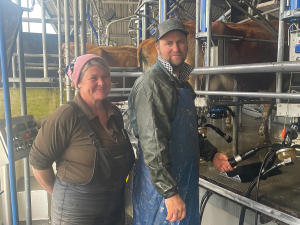Ngatimaru Jerseys, located near the Canterbury coastline, represents a blend of heritage, family commitment and forward-thinking dairy farming.
The Russell family has established a Jersey herd that balances production efficiency with animal care, environmental awareness and innovation. Their approach reflects broader changes in New Zealand dairying and highlights the enduring value of the Jersey breed in a competitive and sustainability-focused industry.
The farm traces its Jersey heritage back to the 1960s when the stud name was first registered by Sara Russell’s grandfather in Taranaki. In the mid-1990s, the family moved south to convert a Hawarden property to dairy, bringing their Jerseys with them. After selling that farm, Sara’s parents purchased their current property in 2000. Originally a deer farm with flat, fertile soils and solid irrigation potential, it became the foundation of today’s Jersey-focused business.
Stuart and Sara returned from dairy farming in Ireland in 2007 and assisted with the conversion of the property to a full dairy platform. Their goal was to build a predominantly Jersey herd, and today around 85% of their 935-cow herd are pure Jerseys, with registrations actively maintained. A small number of crossbreds, along with a few Guernseys and Brown Swiss, remain, but Jerseys form the backbone of the system.
The farm covers 283 effective hectares and is part of the Eiffelton Community Irrigation Scheme. Five centre pivots and well-managed irrigation infrastructure provide near full coverage. Annual rainfall is close to 1200mm, and irrigation runs from November to March most seasons. Though close to the Hinds River and at risk of flooding, strategic drainage and elevated infrastructure help protect cows and equipment. The proximity to the coast helps maintain relatively mild conditions year-round.
Production targets sit around 440,000 kgMS per season. Cows average 500 kgMS from a liveweight of just 420kg, highlighting the impressive feed conversion efficiency of Jerseys. Around 800kg of supplementary feed per cow is provided annually, including grain blends fed through a DeLaval 54-bale rotary shed installed in 2007. Pasture performance averages 17 tonnes DM/ha annually. The herd is predominantly A2, and while they currently supply Synlait, market conditions for A2 milk are closely monitored. With the purchase of an additional runoff block, the family has recently increased cow numbers and retained more heifers to bolster growth.
Read More:
Animal health at Ngatimaru Jerseys is supported by a combination of stockmanship and technology. The introduction of automatic calf feeders has improved calf welfare and reduced health challenges after weaning. Contrary to some perceptions, Jersey calves are not fragile but benefit from attentive care and warmth during colder conditions.
Calves are reared with careful attention to mineral status, genetics and environmental comfort. The use of sexed semen in Jersey matings has increased the value of bull calves, which are now in strong demand from rearers. The additional runoff land has enabled young stock to graze off-farm before returning as in-calf heifers, reducing pressure on the milking platform.
Herd health is also monitored through the Smaxtec bolus system, which tracks internal temperature to detect early signs of illness, metabolic changes or infection. This technology has significantly reduced mastitis incidence and labour requirements, with cell counts averaging around 75,000. The boluses, with a five-year lifespan, are fitted to cows as they enter the herd or earlier and can be used alongside grazing management technology such as Halter.
Breeding decisions at Ngatimaru Jerseys balance heritage and progress. While the Russell family values long-lived cows with strong type and temperament, they also place emphasis on fertility, functionality and health traits. Breeding Worth (BW) is considered but not used in isolation; instead, individual breeding values are evaluated to build a balanced herd.
Overseas genetics, predominantly through Semex, are used to introduce durability, type and health traits. Many of the early imported Jerseys have remained productive in the herd for more than a decade. Polled genetics are becoming more prevalent, with around a quarter of calves naturally polled. Bull calves from high-performing cows are DNA tested, registered and retained for use over heifers. Artificial breeding is carried out by Stuart, often twice daily during mating to maximise precision and conception rates.
A Team Effort
Beyond the farm gate, the Russell family contributes to the Jersey and wider dairy community.
They are involved in the revival of the Canterbury Jersey Club, helping rebuild connections between breeders and encouraging knowledge-sharing. At a national level, Sara Russell has recently been elected as a director of JerseyNZ after previously serving as associate director and completing governance development programmes.
Her involvement reflects the importance of breed organisations in advocacy, youth engagement and industry leadership.
The next generation is already embedded in Ngatimaru Jerseys. Richard works locally and assists on the farm when possible, while Margaret, at 15, has developed a strong commitment to Jerseys. She has competed on the New Zealand youth team, gained experience overseas and remains active in the local show ring. Whether her future lies in farming or veterinary science, the Jersey breed is firmly part of her journey.
Pam Goodin is general manager of JerseyNZ.









